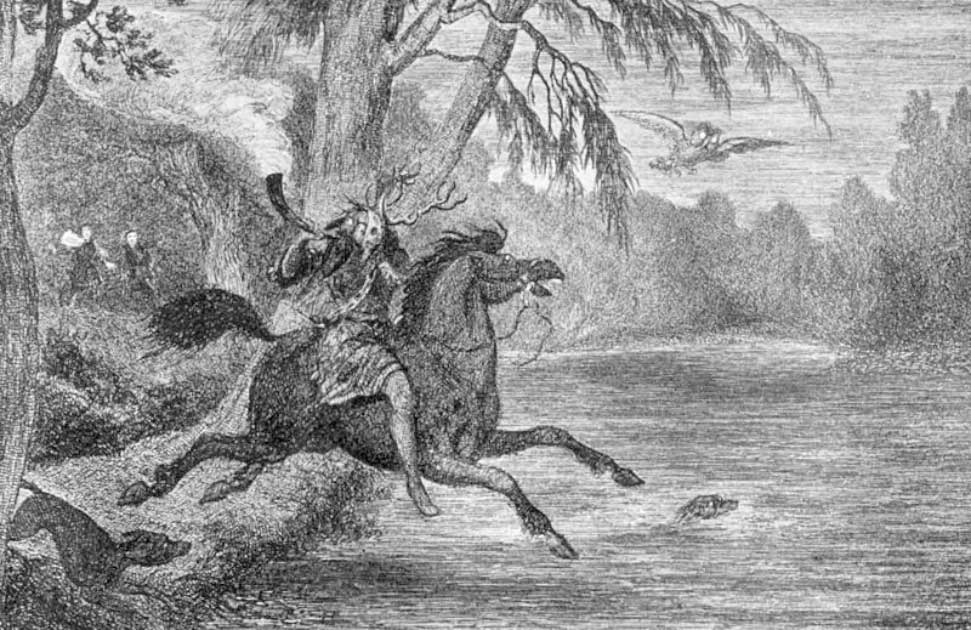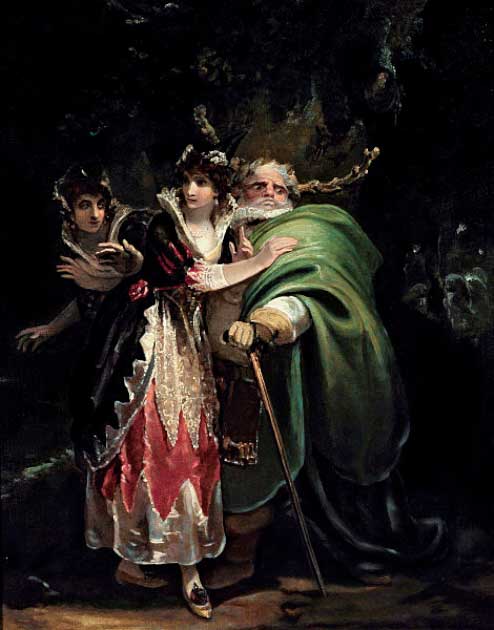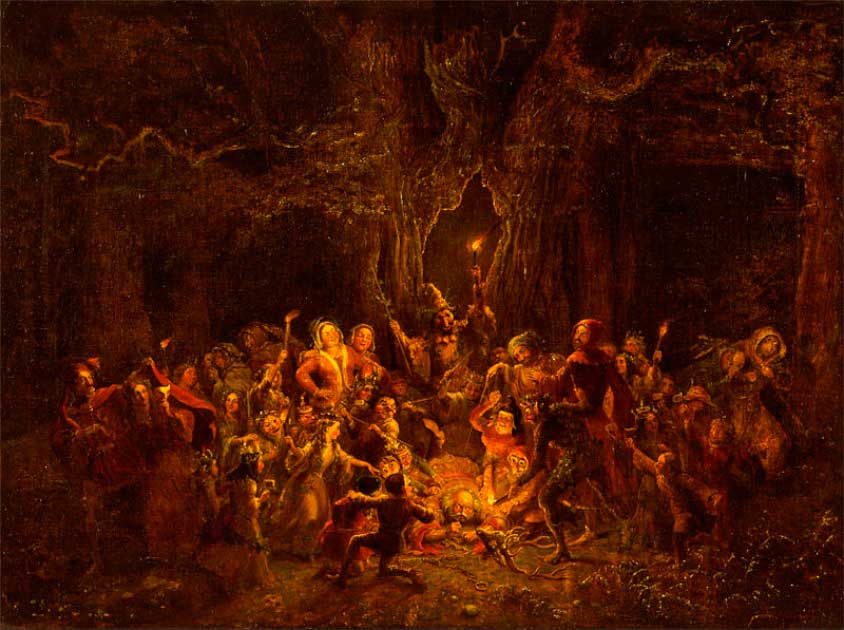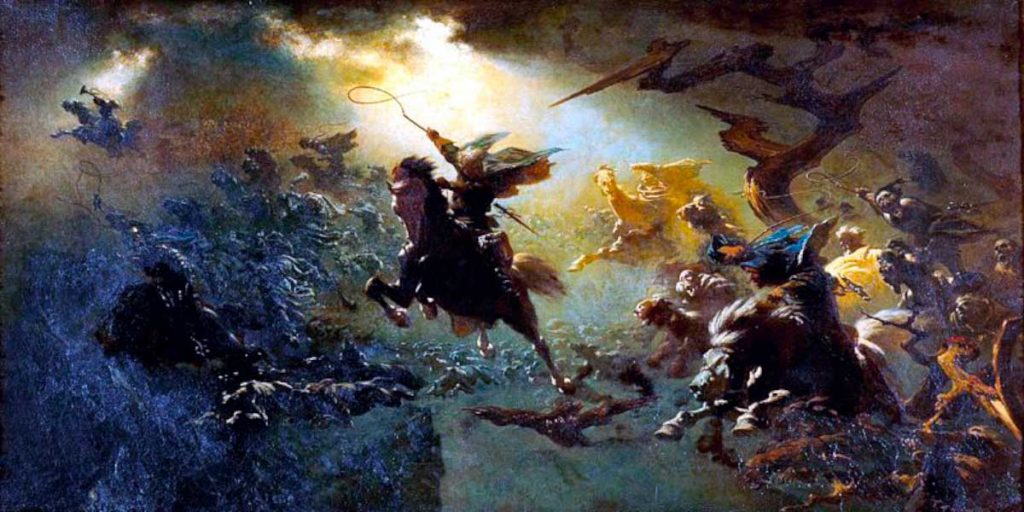While less popular than Greek, Roman, or Nordic mythology, English mythology and folklore are filled with various characters that have persisted through time. There is Robin Hood and his band of Merry Men, which comes from Nottingham.
The leaping devil Spring-Heeled Jack who caused legitimate fear in Victorian Era London, or Jack O’Kent, a cunning man from Herefordshire known for his ability to outwit the devil. Plus, who can forget the most significant mythological figure from England, King Arthur, with his Knights of the Round Table and the Holy Grail?
While we hear more about these more widely known characters, there is a unique one that isn’t often spoken about. In Berkshire, there is a legend of a ghost that resides in Windsor Forest. Herne the Hunter might be one of the most interesting ghosts haunting England.
Herne the Hunter
Herne the Hunter, in English folklore, is a ghost tied to Windsor Forest and Great Park in the county of Berkshire, England. Herne the Hunter has antlers that grow from his head, rides a horse, torments cattle, and rattles chains in the forest.
One unique thing about Herne the Hunter is that he is a local folkloric character that only appears in Berkshire, nowhere else in Great Britain. Herne the Hunter is said to be tethered to an oak tree called Herne’s Oak. The exact location of Herne’s Oak was speculated among the people of Berkshire, and in old geographic survey maps, Herne the Hunter’s Oak was slightly north of Frogmore House in the forest to the east of Windsor Castle.

The oak tree near Frogmore House was chopped down in 1796, but in 1863, another tree was claimed to be the real Herne’s Oak tree. This second Herne’s Oak tree was blown over during a storm, and shortly after, Queen Victoria had another oak tree planted in the same place.
This was the new Herne’s Oak which stood until 1906. The avenue the tree was located was being replanted, which led to the tree’s removal. The latest oak tree planted in 1906 has adopted the title of Herne’s Oak and still stands today.
A Shakespearian Character?
One of the earliest written accounts of Herne the Hunter is found in William Shakespeare’s 1602 play The Merry Wives of Windsor. The published versions of the play tell the tale of Herne the Hunter, the ghost of a Windsor Forest keeper who haunts one oak tree in the wintertime. Herne the Hunter is mentioned in Act 4, Scene 4 of The Merry Wives of Windsor.
“There is an old tale goes, that Herne the Hunter
(sometime a keeper here in Windsor Forest)
Doth all the winter-time, at still midnight
Walk round about an oak, with great ragg’d horns;
And there he blasts the tree, and takes the cattle,
And makes their milch-kine yield blood, and shakes a chain
In a most hideous and dreadful manner.
You have heard of such a spirit, and well you know
The superstitious idle-headed eld
Receiv’d, and did deliver to our age
This tale of Herne the Hunter for a truth.”
An earlier version of the play describes Herne the Hunter differently. In this version of the play, the ghost is named Horn, and he was invented to scare kids, a sort of British boogie man.

Samuel Ireland, a Shakespeare admirer, wrote a further explanation of Shakespeare’s Herne the Hunter tale in 1792. Ireland explains, “The story of this Herne, who was keeper in the forest in the time of Elizabeth runs thus: – That having committed some great offence, for which he feared to lose his situation and fall into disgrace, he was induced to hang himself on this tree [Herne’s Oak].”
As time has passed, more details about Herne the Hunter have been attached to his folkloric story. Sometimes Herne the Hunter is said to have been gored to death by a stag, but the Devil appears and saves the dying man on one condition, Herne must wear the stag’s antlers.
Herne has been described as wearing the skin of a stag as a cloak with the antlers on top of the “hood,” or the antlers grow from Herne the Hunter’s head. Herne the Hunter is said to make cows produce blood instead of milk (as mentioned in The Merry Wives of Windsor). In some legends, Herne the Hunter can make a tree shrivel up and die with a simple touch.
Jacob Ludwig Karl Grimm, aka Jacob Grimm of the brothers Grimm, wrote that Herne the Hunter was once the leader of the Wild Hunt. The trouble with folkloric tales is that their origin becomes murky as time progresses, and the tale is told and retold by others.
The Origin of Herne?
The origin of the character of Herne the Hunter is unknown; however, this has not stopped authors and scholars from suggesting theories as to the Hunter’s true origin. In 1929, author R. Lowe Thompson suggested in his book The History of the Devil – The Horned God of the West that the name Herne might have come from the Gauls.
Thompson believes the name is “a cognate of the name of Gaulish deity Cernunnos.” The English word for “horn” is a cognate, derived from the Latin word “cornu” Thompson explains that if the word “horn” came from “cornu,” Herne might have been the name Cerne, but the sounds shifted due to the linguistic evolution of the English language.
Another theory of Herne the Hunter’s origin is related to the Anglo-Saxons. In the Middle Ages, Windsor Forest was controlled by the Angles, pagans who worshiped many gods, including one named Woden. Woden is the equivalent of the figure of Odin in Norse mythology.
- Hunting the Tikbalang, Spindly Horse Monster of the Philippines
- Orang Pendek: Is There An Unknown Great Ape In Remotest Sumatra?
One of the many myths about Odin is that he would ride across the sky at night with spectral hunters and hanged himself from Yggdrasil, the world tree, in order to uncover a secret rune alphabet. This relates to Herne the Hunter because the name may have come from the word “Herian,” or in Old Norse, Einherjar, the title Woden would adopt while being the leader of fallen warriors and hunters. This theory is one of the less popular ones.
Then there is the theory that Herne the Hunter was a real person. Herne might be the ghost of a man named Richard Horne, a landowner/middle-level servant of Henry VIII who was caught poaching in Windsor Forest.

This idea comes from Shakespearean scholar James Halliwell-Philipps, who found a document from the 1500s that listed a person named Horne as a hunter who was caught and confessed to poaching. This theory is interesting, considering that the first edition/unpublished version of The Merry Wives of Windsor was spelled Horne. It is worth noting that Horne is a very common British surname.
Simply a Motif?
Herne the Hunter illustrates a ghostly motif. The mention of Herne the Hunter committing suicide is in line with a long-held folkloric belief that a violent death or a suicide is ground zero for a haunting. If someone dies in a certain location, his/her/their ghost will haunt that location for eternity.
Herne the Hunter is said to rattle chains, which, again, is a typical ghost motif. Ghosts rattling chains can be found in Oscar Wilde’s The Canterville Ghost, Charles Dickens’s A Christmas Carol, and M.R. James’ ghost story Rats.
The legend of Herne the Hunter shares with other characters a well-known folklore motif, The Wild Hunt. The Wild Hunt can be found in folklore from many northern European cultures. The Wild Hunt motif presents “a chase led by a mythological figure escorted by a ghostly group of hunters engaged in pursuit.”

The leader of the Wild Hunt is associated with many significant figures from myths and legends. Odin, the Italian leader Theodoric the Great, the psychopomp Gwyn ap Nudd from Welsh mythology, and even several biblical figures like Cain, Gabriel, Herod, or the Devil. It is not uncommon to find mention of hounds (hellhounds) in descriptions of the Wild Hunt.
To see the Wild Hunt was an omen that something terrible was coming. Be it the death of a king, an outbreak of plague, war, and sometimes a prophecy of death for those who have witnessed the Wild Hunt.
The true origin of Herne the Hunter may never be found. Other than in The Merry Wives of Windsor, and its various versions, there is almost no written evidence about Herne the Hunter until the 1840s. Next time you visit Berkshire, keep an eye out for this ghostly antlered rider near oak trees.
Top Image: Herne the Hunter, leader of the Wild Hunt, is an ancient British legend with an extremely uncertain history. Source: AI Studio – R / Adobe Stock.